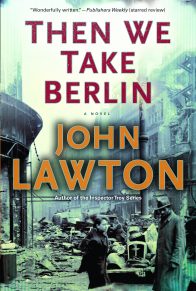He looked at his watch. The hands weren’t moving. Fuckin’ Rolex. He had only himself to blame, choosing a Madison Avenue status symbol over something that actually worked. Next time a Longines. Maybe the British weren’t late?
He was expecting Eddie Clark. MI6 had insisted on one of their own being present so had prised Eddie out from behind his desk, as the one man they trusted for a positive identification. That Eddie regarded Frank Spoleto as the spawn of Satan didn’t seem to figure.
He was also expecting some diplomat or other. They trusted Eddie so far and no farther—what was clear was that they didn’t trust him with the money. So there’d be a diplomatic bagman. So there’d be a talking suit, a talking suit chained to a briefcase full of the folding stuff, just like a Pinkerton agent.
He wasn’t.
When the Merc pulled up, Eddie got out of the driver’s seat and opened the rear door for the bagman, who wasn’t chained to anything. He was a little guy, no taller than Eddie—a snazzier dresser: silk scarf, pigskin gloves, black cashmere overcoat, collar turned up against the night air.
The bagman picked up a nifty-looking attaché case and the two of them approached Frank.
“What kept you?”
Eddie looked at his watch. He appeared to have one that worked. “We’re bang on time.”
“You’re late!”
“No we’re . . . oh fuck you. I might have known you’d start summat. Frank, this is—”
“Forget it, Ed, let’s just get out there and get this done.”
Frank walked off and hearing no footsteps turned and glared at Eddie. The bagman spoke: “It’s fine, Eddie. Stay here. I can handle this.”
“I’m supposed to ID him.”
“Damn right you are,” Frank yelled.
“I can do that,” the bagman said.
Frank wasn’t sure just who he was talking to, but the bagman joined him with a witheringly polite English fuck-you: “Lead on, Mr. Spoleto. I’m at your service.”
“In about fifty yards we’re gonna meet the US border guards. Do not call me by name.”
“Then what do I call you?”
“Colonel. Just call me Colonel.”
“Colonel who?”
“I forget. Murphy, Moriarty. Something Irish. Just stick to ‘Colonel.’”
Fifty yards on, a uniformed US Army captain saluted and raised the barrier. Frank returned the salute.
Another fifty yards and they’d be at the centre of the bridge. There was a three-quarter moon peeping in and out of clouds and the river mist danced around them playing now-you-see-it-now-you-don’t.
“Are they there?” the bagman asked.
“No idea. Maybe they keep time as well as you. But let’s take it slow for now. Nice ’n’ easy.”
“Whatever you say.”
“You say you can make the ID?”
“Of course.”
“So you knew him?”
“I did.”
“Hmm. So, what’s your name?”
“Freddie.”
“I don’t ever recall him mentioning any Freds.”
“Then call me Troy. He always did.”
“So—Mr. Troy.”
“Actually it’s ‘Lord Troy.’ Not that it matters.”
“Damn right it doesn’t. Why’d they send a lord? I thought you guys just wore ermine and sat around on wool sacks.”
“Simple. I put up the money.”
“What? All twenty-five grand?”
“Yes.”
“You think he’s worth twenty-five grand?”
Troy did not answer. They’d reached the middle, the line over the Havel that marked the border between West Berlin and East Germany—and there were no Russians and, worse, no Joe Wilderness.
A Bit Less of a Prologue
Poland, West of Oswiecim January 1945
Auschwitz was remote now, no smell of burning flesh, no film of grease at the back of the throat. Vienna remoter still. No music. She could not recall a day without music. Silence was . . . unheard. They were alone, painted onto a fairy-tale landscape, at one with a mute, near- translucent nature—two children, Kay and Gerda, waiting/not waiting for the appearance of the Snow Queen on her silver sleigh. Silent upon a plain in Poland.
Méret recognised this for what it was—the onset of madness, a mad- ness she had held at arm’s length, at bow’s length, for the best/worst part of a year.
Magda broke the spell.
“Why . . . why aren’t we dead?”
Méret put an arm under Magda, lifted her to her feet.
She looked back at the German soldier. Motionless, expressionless, his rifle held carelessly, pointing at nothing.
“He’s Wehrmacht. He’s not SS. Maybe he just doesn’t care anymore.” And they followed the soldier’s footsteps in the snow.
Inside the shepherd’s hut, half the roof had collapsed, and he was gathering wood and straw from the debris to light a fire. Méret scooped a clear space on the ground, and the soldier turned out his pockets for scraps of paper and a box of matches. Between them they fuelled the fire well into the night. Their eyes never meeting.
When he was ready to sleep, the soldier slipped his arms from the sleeves of his greatcoat and sat inside it like a wigwam, head down, below the collar, snoring. Méret copied him, buttoned her greatcoat around both of them—Méret a human blanket for Magda, Magda a human blanket for her—and slept.
She awoke alone. No soldier. No Magda. It was light.
She heard feet on snow.
Magda put her head in the door.
“He’s gone,” she said. “He was gone before I woke up.”
And as she spoke, Méret heard a diesel engine and watched Magda turn in the doorway and vanish.
“Magda? Magda?”
Then feet, running feet crunching across the snow, and Magda’s scream.
Méret stood in the doorway. Half a dozen men in quilted, white winter overalls, giant babies in romper suits with tiny red stars on their foreheads, were standing around watching as a comrade ripped Magda’s rags from her body and fumbled at the zips on his white suit.
Magda screamed. Méret stood rooted to the spot, facing Russian troops, wrapped in a German greatcoat.
Behind the troops, two officers approached without urgency. One short, one tall, major and lieutenant. The short major put a revolver to the rapist’s right ear, and what she said needed no translation.
The man spat, cursed and ignored her.
She shot him in the head, turned her gun on the spectators and waited until they slowly turned away and walked back to the road.
The tall lieutenant came right up to Méret.
“At last. I was beginning to think we’d never find you,” he said in flawless German.
It was as though he was talking to a wayward child lost now found in a street market.
“Don’t worry. You’re safe now. Both of you.”
Her own helplessness appalled her. She let the man take her by the arm, hustle her past Magda. The woman major was helping her dress. The rapist lay sprawled on his back, blood melting the snow around his head.
She wanted to see Magda’s eyes, to look her in the face, but they moved too quickly.
The lieutenant opened the rear door of an armoured half-track and gently pushed her in.
“Trust me,” he said. “Your friend will be fine.”
A minute later the woman major joined them, and the half-track started up—a fug of smothering heat and diesel.
“Where is Madga? I want to see Magda.” The man answered.
“She’s fine. No harm will come to her.”
Even Less of a Prologue
Hampstead, London June 1941
Charlotte had had a problem—with God and Marx and Stalin. On the night of June 21, 1941, Hitler had solved it for her. Her conscience was no longer conflicted. She poured herself a very large gin and lime, sat back, kicked off her shoes, stretched her legs, flexed her toes and smiled as two and a half million German troops invaded Russia—Barbarossa.















